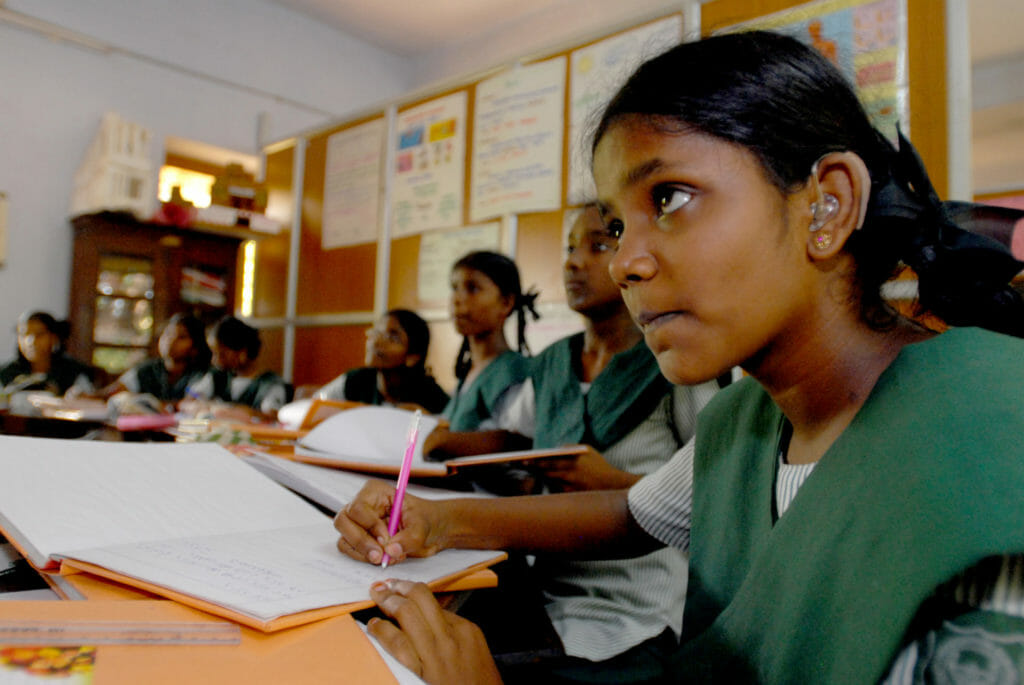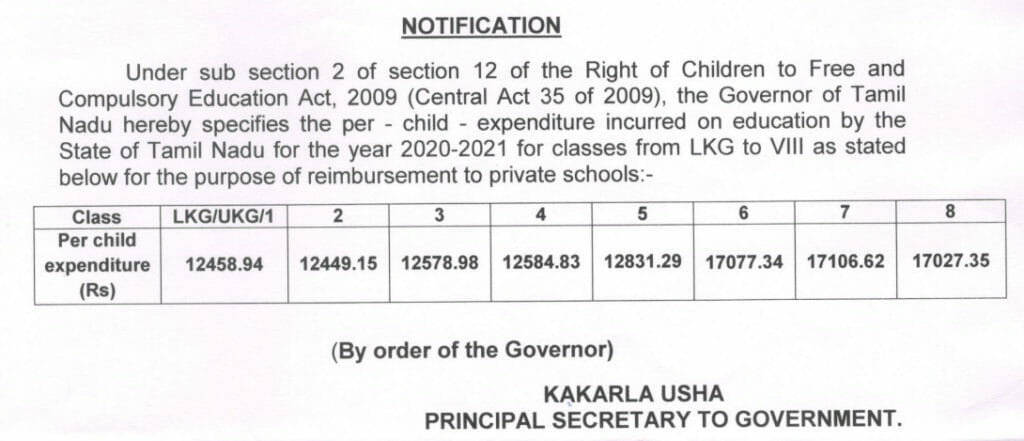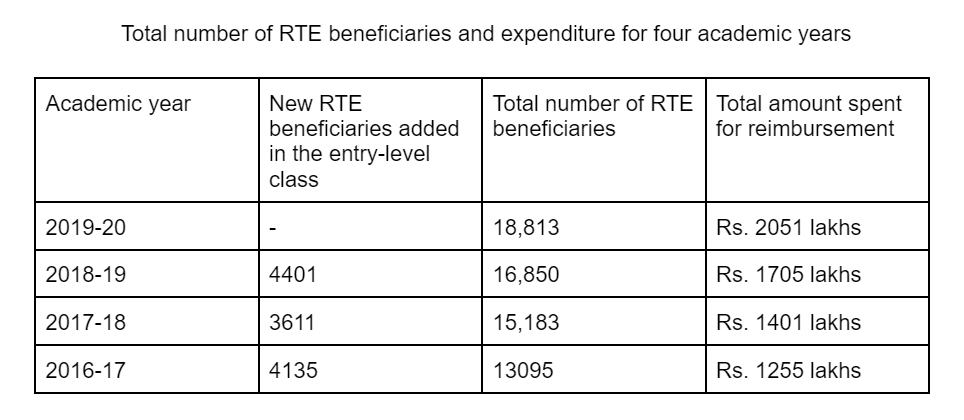“Right to Education is a beacon of hope for us as we wish to see our children get educated,” says Sita*, a daily wage worker. Her child has secured admission in a private matriculation school in Chennai on a seat reserved under the Right to Education, or RTE, Act. “We cannot afford the fees of private schools. I did not study, but I want to see my child educated, and climb up the ladder of life.”
The Right of Children to Free and Compulsory Education Act or Right to Education Act (RTE) is an Act of the Parliament of India enacted in August 2009, which lays out the modalities of free and compulsory education for children between 6 and 14 in India, as guaranteed under Article 21A of the Indian Constitution. The Act has been a game-changer for children from many low-income families by providing access to quality education in private schools. However, much seems to be lacking in the implementation of the rules in schools across Chennai.
Tamil Nadu government introduced the state RTE rules in 2010, with the aim of providing free and compulsory education for all children up to the age of 14.
Eligibility for obtaining an RTE seat: Children belonging to Economically Weaker Sections (EWS), whose family’s annual income from all sources does not exceed Rs 2 lakh, are eligible to get an RTE seat in Chennai. Moreover, the RTE admission would be given on priority to candidates from SC, ST and backward classes. Similar preference would be given for children who are orphaned; disabled; HIV-infected; wards of scavengers and trans people.
Application process: During April-May of every academic year, the Tamil Nadu RTE portal opens up for applications. Parents can apply to a maximum of five schools for admission of their children at the entry-level Class. But the RTE eligibility mandates that the schools be within a one-kilometre radius of the house of the applicant.
However, the distance rule can be relaxed if the schools have vacant seats within the prescribed 25%, as per a recent Madras High Court direction. This means people can apply for RTE seats beyond one kilometre if the school’s RTE seats are vacant.
“The point of RTE is to bridge the existing class and caste gaps in society, to create the possibility of an inclusive society”, says Ra Shhiva, advocate and Head of South Operations and Public Partnership, Indus Action, a rights-based policy implementation organisation based in Delhi and operations across India including Chennai.**
There are 392 matriculation schools offering 25% of its total seats for RTE in Chennai, up to Class 8. However, minority schools do not fall under the RTE Act.
The case of CBSE and ICSE schools
Since the state government introduced RTE in unaided private schools under the state board in Chennai, CBSE and ICSE schools have not been a part of the state-approved RTE schools list. So, do they provide RTE seats?
“They do, if parents go personally and ask, as per the CBSE Chennai Regional Office,” says Shhiva.
Many parents don’t seem to know that. “I was not aware that we can personally go and ask for RTE seats in CBSE schools. I would have put my child in the CBSE board had I been aware. Now, I cannot change schools. I am afraid I will lose the RTE seat,” says Sita.
“The CBSE schools we spoke to, said that the reason they are not part of the main process is that their admission begins in February, before the state board or matriculation schools,” says Shhiva.

Issues at the entry-level in RTE
This academic year (2022-23), Chennai saw the highest number of RTE applications in Tamil Nadu: 29,000 applications vied for 4100 RTE seats in Chennai. Due to the pandemic, many people faced job losses, and the financial stress led them to opt for RTE admission for their wards. However, the final number of beneficiaries is yet to be finalised for the current academic year, confirms the Chief Education Office of Chennai district.
Securing an RTE seat is not as simple as it sounds. “A parent can only apply for the entry-level Class, and cannot get an RTE seat in any other,” says Gilber Alfred, an RTE programme associate from Bhumi, an NGO working in the education sector. Among the 392 schools in Chennai, only two schools allow entry at the Class 1 level, while the rest of the schools start with LKG.
What this effectively means is that if someone wants a seat in Class 1 in a school where LKG is the entry-level class, they will not be eligible for an RTE seat, even if they belong to the economically weaker sections.
Many parents are unaware of this and consequently, miss out on getting their children admitted to their desired school under RTE. Seats are not available for candidates seeking admission in classes higher than the entry-level class of a school. Sumathi, a stay-at-home mom from Adyar came to know about the RTE option only last year when her child was studying in Class 3 in a private matriculation school. Now, she cannot apply for an RTE seat in Class 4. “LKG is the starting class in the school of my daughter, and the school says we should have applied then. However, we are finding it increasingly difficult to pay her fees and run the family,” clarified Sumathi.
If a school has more RTE seats than the applications it has received, allotment will happen immediately. “If, however, a school has only eight seats under the RTE and receives, say, 13 applications, the final selection will be through an offline lottery. The parents have to visit the respective schools to know the admission status of their wards,” explains Shhiva. “To ensure transparency in the lottery, a parent, principal and RTE officers of the school are called.”
“At least one of the applicant parents is called. However, the lottery dates are put up on the RTE website of the state for all parents to see. The parents need to go to the schools they have applied to, in order to find out if their child has been allotted a seat or not via the lottery,” said Shhiva.
There are, however, allegations that the lottery for selection does not always take place in a fair manner. “Some schools give off the RTE seats to the children of staff working in the school. For instance, they may give RTE seats to the wards of the watchmen and housekeeping staff working in the premises,” says Shhiva. “In some schools, the lottery itself does not happen,” says Gilber.
Read more: Councillor talk: K Karthik to focus on improving schools and civic amenities in Ward 7
Filling the gaps in the admissions process
“The core problem is transparency. There are two processes involved here: application and admission. The application process is very transparent, and it is online, while admission is offline in Tamil Nadu,” says Shhiva.
“In other states, RTE admission is also done online. They conduct an online lottery, and the results are also given online. In our state, after the parents apply, they are not able to check the admission status online. They have to go to the school to check whether their wards have received the RTE seat or not. Moreover, we do not know how the lottery happens in the school,” says Shhiva, calling for an online and transparent admission process.
“Entry-level class for an RTE student must be either LKG or Class 1, based on the age of the applicant, and not on the school’s prerequisite,” adds Shhiva.
Another key issue to address is awareness of the system. “I did not know about RTE when I got a paid seat from a private school for my child. Now, I know about it and want my brother to secure an RTE seat for his daughter next year,” says Sumathi.
Low-income families forced to pay extra under RTE
In an alarming trend, it has emerged that in some cases, the promise of free education under the law is also only a mirage.
“I took an RTE seat for my child last year, and I have been paying full fees for two years now. The school says that they will reimburse my money when they are in turn reimbursed by the government,” said Santhosh*, a parent. “If we do not pay, they will withhold my ward’s report card. I have heard this from other RTE parents as well.”
Some schools exempt parents from tuition fees but ask them to pay for books, uniforms and other miscellaneous fees. “I paid more than Rs. 9000 for books and uniform for my child who is an RTE student,” said Sita. This, despite the fact that charging RTE students for any particulars, is a violation of Section 5 of Tamil Nadu RTE rules.
“Sometimes, the schools ask the parents to pay some amount to be selected in the lottery,” says Gilber.
“I am afraid to complain, as I do not want the studies of my child to be affected,” says Santhosh.
Delay in disbursements under RTE
It is a fact, though, that schools too find themselves struggling to finance the cost of RTE seats. Despite an increase in admissions and the amount allocated for reimbursement of school fees, there have been issues with the disbursement of funds. “We do not always get complete reimbursement. Apart from that, there is also often a delay in the money reaching us,” says the head of a private school under the RTE umbrella.
RTE is applicable from the entry-level Class (LKG or Class 1) to Class 8, and the government has proposed a split-up of reimbursement for every class.

The Directorate Of Matriculation School reimburses the fees for RTE students, but schools say they are yet to receive the reimbursement for the previous academic year. The Union Government pays 60% of the fees, while Tamil Nadu Government pays the rest. However, the state government says that the required funds have not yet come from the Union Government. Therefore, it has not been possible to reimburse the schools in Chennai and the state.
“We always get the RTE reimbursement in September for the previous academic year [2020-21]. We are expecting refunds from the government this September for the previous academic year,” reveals a school in South Chennai, which did not want to be named. “But they sometimes withhold a portion from the stipulated amount while reimbursing us.”
Given below is the total number of RTE beneficiaries and the amount spent on RTE from 2016-17 till 2019-20 in Chennai.

When we asked for the total number of beneficiaries for 2020-21, the officials from the Chief Education Office of Chennai said the data is not yet available. However, a G.O stated that only 75% of the actual fees would be paid for 2020-21, as the schools must have saved on electricity and maintenance charges during the lockdown.
Grievance redressal of RTE beneficiaries
Multiple avenues are available for parents to raise their issues with schools found violating the RTE norms.
Parents can report their grievance to the Tamil Nadu State Commission for Protection of Child Rights, which usually sends notices to the schools for not following the RTE Act. They can also report to the Chief Education Officer or District Education Officer of Chennai.
Apart from this, parents also can contact 14417, which is a student helpline number in Tamil Nadu that also looks into grievances related to RTE.
The authorities from the Tamil Nadu School Education Department send a notice to the school listing the violations. The school must reply within a month. If the explanation is not satisfactory, or if the school does not respond, the authorities must inspect the school. If the violations are found to be valid, the authorities may withdraw state recognition of the school, after giving a chance for the school to be heard.
If the school is found to be guilty after the hearing, it will lose its recognition from the following academic year. This is as per the Tamil Nadu Right of Children to Free and Compulsory Education Rules, 2011. According to the RTE Act, 2009, no school is allowed to operate without state recognition.
But while such protections exist on paper, the many operational lapses around RTE in Chennai make access to affordable education a distant dream.
“What is the use of complaining? They may target my child in school. Even if the school loses its recognition, who knows if my child will get an RTE seat in another school? Moreover, even if my child gets an RTE seat in another school, they may target us because we complained about the previous school. At the end of the day, we have to comply and pay whatever they ask for. My child’s education cannot be sabotaged,” says Santhosh.
The needs of the hour include transparent implementation, the teamwork of state and union governments to fund the scheme, a strong grievance redressal mechanism and the cooperation of schools. For, as most parents echo, “RTE, if implemented well, can help our children to not suffer the same fate as we did.”
*names changed on request.
**Errata: The name of the person quoted and the profile of his organisation have been changed following clarifications from the source.